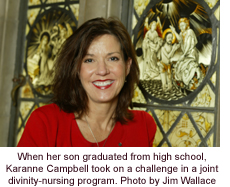Karanne Campbell: A Joint Degree in Nursing, Divinity
Karanne Campbell returned to school at age 43 to combine her interests in faith and caring

Karanne Campbell has plotted her participation in this weekend's graduation ceremonies with the precision of a small military operation.
Using a variety of carefully timed maneuvers, she and her family will attend separate hooding ceremonies for the Divinity School and School of Nursing that begin 30 minutes apart on Saturday, university-wide commencement exercises in Wallace Wade stadium Sunday morning, and simultaneous receptions that follow at the two schools.
That last part -- the simultaneous receptions -- may be a little tricky, but somehow Campbell is convinced she can pull it off. After the past three years, being in two places at once should be a piece of cake, she says.
Since August 2000, when Campbell arrived on campus as one of the first students in Duke's Health and Nursing Ministries Program, she has hustled back and forth between the Divinity School and the School of Nursing, taking classes each semester in both theology and advanced nursing.
While all students in the program study in both schools, most emphasize one track or the other, working over two years to receive either a master's in Church Ministries from the Divinity School or a Master of Science in Nursing from the School of Nursing.
Campbell, however, was the first -- and, so far, the only -- student to choose a third option, a three-year joint-degree program. This weekend, she will graduate with both degrees.
More remarkable still is the fact that Campbell is 46 years old, a single mom who had just completed the hard work of raising three children when she decided to throw over her entire life and go back to school. While most older students spend months or years agonizing over such decisions, Campbell made her choice almost overnight.
A home health nurse in Asheville, N.C., who's passionate about her work with dying patients, Campbell was not even thinking about going to graduate school when, in May 2000, she heard about two new programs at Duke: the Health and Nursing Ministries program, which was then enrolling its first class of students, and the Duke Institute on Care at the End of Life, which the Divinity School had launched a few months earlier.
After sending off for information, Campbell knew immediately that Duke was where she wanted and needed to be. Over the next three months, after her youngest son graduated from high school, she took her GREs, quit her job, sold her house, moved to Durham and started school.
"It was the scariest, most exciting thing I had ever done," Campbell says. "I left everything that was comfortable and known -- my address, my job, my home, my roles as a mother and a nurse -- and moved here to start a program where everything was unknown."
Being back in school at age 43 was intimidating at first. As a nurse for more than 20 years, she knew what to expect from her classes in the nursing school, but theological education was something new and unknown. Initially, she had envisioned the divinity classes as almost a "sabbatical" that would give her a break from her nursing studies.
"I thought it would be this soothing, nourishing 'walk with God,' a time for spiritual exploration," she says. Instead, the divinity classes proved to be some of the most intense, demanding, rigorous and exciting parts of the entire program.
"Like Dr. (Will) Willimon says, 'This Christianity thing is not a feel-good faith.' It's supposed to change you, grab you, shake you up and transform you."
And that's exactly what happened over the past three years, Campbell says.
"I can't believe the way that I've grown. My knowledge, my faith, my courage and my confidence have all been strengthened."
The program has already changed the way she practices nursing. Before, in her work in end-of-life care, she often felt inadequate to help the dying deal with their spiritual crises.
"It wasn't that I wanted to be able to answer their questions, but I wanted to have strength of my own, to be better grounded in my own faith so that I could be with my patients in a way that was healing and up-building."
Now, she listens with a different ear.
"I can better hear what they're saying and what they're not saying. In dying, questions about God are not always posed in an articulate way, but now I can hear the crises they're struggling with and my responses are different."
No, she still can't tell a patient why they're dying of cancer or AIDS or some other disease, nor will she ever be able to do so.
"But when I go to the bedside now, it's with a stronger faith. I may not understand why things are happening with a patient, but I have peace in knowing there is a faithful God who will carry them through, no matter what."
Following graduation, Campbell plans to spend the summer studying for her nurse practitioner board exams and mull over a couple of job offers, including a joint position with a physician practice and a hospice in Palm Beach, Fla. But mostly she plans to slow down and rest.
"It's been a long walk, and I'd do it again in a heartbeat. But right now, I just need to take a breath."
Written by Bob Wells.